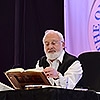 Michael Laitman, On Quora: “Why we need to work?“
Michael Laitman, On Quora: “Why we need to work?“
We need to work so that we connect and serve one another, as it is written, “Go and make a living from each other.”
Our lives are arranged such that we are forced to connect to each other: I give to you, and you give to me. For example, I give you shoes, and you give me clothes, and another gives me bread and wine, and I give them one or another thing.
We thus see that, out of a survival necessity, we are made to communicate with each other.
Then, as our desires grow over time, we develop more and more goods and services that increasingly connect us. This process of increasing interconnection and interdependence is a subconscious correction that we undergo.
We need to learn why this process unfolds the way that it does, and where it ultimately leads us. For the time being, we can see that our desires’ development over history, from small individual desires for food, sex and family, through to more and more egoistic desires where we use others to benefit ourselves—social desires for wealth, honor and power—lead us to a state where we find ourselves becoming increasingly dissatisfied.
The human ego that wishes to benefit itself at the expense of others finds more and more sophisticated ways to make shovels for digging its own grave. In other words, our scientific, technological and cultural progress brings us to our inability to satisfy our ego’s growing demands, and we remain empty.
What do we truly want out of this entire process?
Our true desire is to gain a sense of the meaning of life. Although we constantly chase transient pleasures that slip through our fingers, our innermost desire is for an eternal and perfect sensation of life.
We subconsciously forget ourselves in life so as not to think about its end, because it is terrible to consider that we part with everything we did. And we did everything just to maintain our animal bodies. Why do we live like that? What is the point? At least an animal does not ask such questions.
It turns out that our life without an answer about its ultimate meaning is pointless, insignificant and empty, worse than the life of animals. At least animals do not suffer from existential inquiries. And we, in order not to let questions about our lives’ meaning and purpose bother us, constantly try to engage ourselves with all kinds of toys.
There is no happy ending for our egoistic desires, but there is a happy life above the ego. The entire purpose of seeing how our ego leads us to a dead end is in order for us to, through the helplessness of trying to satisfy our egoistic desires, come to feel a stronger and stronger need to discover the meaning of life—an eternal and perfect existence.
We will then become ready to shift our egoistic approach of trying to satisfy our desires at others’ expense, to a new approach: Instead of working primarily for the sake of self-benefit, we would work first and foremost to benefit others.
Shifting the place where we feel pleasure—from inside to outside ourselves—is the key to discovering the meaning of life: a new perception that is completely connected with the surrounding reality, where fulfillment expands eternally, and where we sense perfection and wholeness.

Based on KabTV’s “I Got a Call. What Is Work?” with Kabbalist Dr. Michael Laitman on March 6, 2011. Written/edited by students of Kabbalist Dr. Michael Laitman.
[313411]
Filed under: Love - No Comments →
 Michael Laitman, On Quora: “Is it possible for a Jew to be an anti-Semite?“
Michael Laitman, On Quora: “Is it possible for a Jew to be an anti-Semite?“













